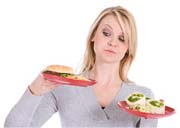Weighing In on Eating Out

Q: Lately, we’ve been eating out several times a week, and I feel it in my clothes–everything is getting tighter! How do I stop this weight gain without completely avoiding restaurants?
A: It sounds like you may be overeating at restaurants–and you’re not alone. Many people see going out to eat as a time to indulge, a “vacation” from their regular healthy diet. But when you’re eating out as often as several times a week, it’s no longer a “special occasion.” Americans seem to be eating out more than ever–according to recent research, as much as a quarter of our meals are eaten away from home and almost half of our food dollars are spent on restaurant/takeout foods. True, kosher restaurants account for a tiny fraction of these statistics, but if you’ve ever stopped at the pizza place on a Thursday night, you know exactly the kind of indulgence I’m talking about.
Get back your control by changing your focus. No more going out with the mindset of splurging. Instead, remind yourself that a restaurant is just a place to get food to eat– and while it tastes good, it’s still only food. Actually, appreciating food for its ability to sustain us, keep us healthy and yes, satisfy us with its delicious taste, too, is a Jewish thing to do (Rabbi Paysach Krohn, “Eating, Living, and Enjoying Life” [lecture, available at www.torahanytime.com]).
It can be tricky to achieve a balance—enjoying food without overeating—especially when confronted with enormous portions and the plethora of fat- and sugar-laden foods common in most restaurants. Try following this plan of action.
Before you arrive at the restaurant:
• Resist the urge to starve the whole day to “save” calories for your dinner out. It will only work against you: you’ll be super hungry and will probably attack the bread basket or appetizers when they arrive. Instead, eat healthful foods throughout the day, and you’ll have the mind–and the stomach–to order right.
• Call ahead. If you know which restaurant you’re headed to, find out if healthy options are available. Ask if the chef will honor special requests like cooking a dish without oil. Have a menu faxed or e-mailed to you so you can browse the selections beforehand.
• Dress the part. Wear something that’s “just-just.” You will be less likely to indulge if you’re feeling pressure on your waist.
• Avoid buffets. It’s more difficult to control your intake when you are free to keep going back for more. The cost to your health–because of the extra calories and saturated fat– isn’t worth the money you think you’re saving.
When ordering:
• Look for key words on the menu. Stay away from menu items listed as fried, creamy, crispy, breaded, au gratin, rich or jumbo. Instead look for items that are baked, grilled, broiled, boiled, steamed, seared and roasted.
• Ask for more information: How big is that steak? Can I get grilled vegetables or a baked potato instead of fries?
• Consider starting your meal with a salad or a broth-based (not cream-based) soup. Research shows that salads and soups help fill one up so that one ends up eating less of the main course, which is typically higher in calories and fat. Be smart–in restaurants (and at some Shabbat tables), actual vegetables are not always a requisite! Crouton-loaded, sugary and mayonnaise-y concoctions do not count as a healthy choice. Memorize this request: “Dressing on the side please.”
• Watch “liquid calories.” People tend to eat more when they drink alcohol with meals. (This is especially relevant to those who frequent the shul kiddush week after week.) Even a regular soda or juice will tack on 100-plus calories to an already heavy meal. Stick with plain water and save your taste buds for the main event–the food.
When the food arrives:
• Eat slowly. Research has consistently shown that people who eat more slowly eat less. So put down your fork, take a sip of water, join the conversation–anything to put the brakes on shoveling food into your mouth.
• Skip the freebies. A recent report in the Journal of the American Dietetic Association found that, on average, “free” side dishes that come with an entrée contain more calories than the main dish.
• Don’t clean your plate. It’s not bad manners to leave uneaten food on your plate. Restaurant portions are notoriously large–often enough for more than one person–so do not feel obligated to finish everything you were served, even if you chose the healthiest item on the menu. In fact, challenge yourself to leave over a bit of everything on your plate.
• Be proud of yourself. If you stuck to your plan and did not overindulge, you can give yourself a pat on the back–but don’t celebrate by whipping out the leftover cake from Shabbat. On the other hand, if you overdid it at the restaurant, don’t feel bad–we’re only human, after all, and we do slip up. To avoid gaining weight, you don’t have to stop eating out, and you certainly don’t have to stop enjoying food. But you do need to modify the way you eat in restaurants–or get back to the kitchen and start cooking for yourself!
Shira Isenberg is a registered dietitian and writer. She has a master’s degree in public health nutrition from Hunter College in New York. Send your nutrition-related questions to ja@ou.org.
